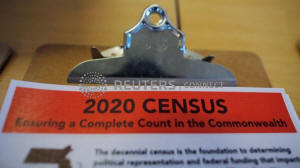|
Groups say U.S. census citizenship
question was designed to influence elections
 Send a link to a friend
Send a link to a friend
 [May 31, 2019]
By Brendan Pierson [May 31, 2019]
By Brendan Pierson
NEW YORK (Reuters) - The Trump
administration concealed evidence that its proposal to add a question
about citizenship to the 2020 U.S. census was intended to help
Republicans draw favorable electoral maps, according to immigrant
advocacy groups that sued the administration over the question last
year.
In a filing in Manhattan federal court on Thursday, the groups said that
the administration hid the fact during the course of the lawsuit that
went to trial last year that Thomas Hofeller, a longtime Republican
specialist on drawing electoral districts, played a "significant role"
in planning the citizenship question.
The conservative-majority Supreme Court is due to issue a final ruling
by the end of June on whether the question can be added in time for next
year's census.
The challengers notified the high court about the new documents in a
letter filed at the court on Thursday afternoon. They did not ask the
Supreme Court to take any specific action.

The plaintiffs, which include the Arab-American Anti-Discrimination
Committee and Make The Road New York, learned of Hofeller's role after
his files came to light in separate litigation in North Carolina in
which Republican-drawn electoral districts are being challenged.
A Justice Department representative said the allegations were a
"last-ditch effort to derail the Supreme Courtís consideration of this
case."
"The Department looks forward to responding in greater detail to these
baseless accusations in its filing on Monday,Ē the person said.
Manhattan-based U.S. District Judge Jesse Furman blocked the question's
inclusion following the trial, but the Supreme Court appeared poised to
overturn that ruling at April's oral argument.
According to Thursday's filing, Hofeller concluded in a 2015 study that
asking census respondents whether they are U.S. citizens "would clearly
be a disadvantage to the Democrats" and "advantageous to Republicans and
Non-Hispanic Whites" in redistricting.
[to top of second column]
|

An informational pamphlet is displayed at an event for community
activists and local government leaders to mark the one-year-out
launch of the 2020 Census efforts in Boston, Massachusetts, U.S.,
April 1, 2019. REUTERS/Brian Snyder

Hofeller went on to ghostwrite a draft letter from the U.S.
Department of Justice to the Department of Commerce, asking for a
citizenship question on the grounds it would help enforce voting
rights, according to the plaintiffs.
The plaintiffs, represented by the American Civil Liberties Union,
said that administration officials gave false testimony about the
origin of the question during the lawsuit, and have asked Furman to
consider imposing unspecified sanctions against them.
Furman has scheduled a hearing on the request for June 5.
Reuters reported in April that the Trump administration believed its
citizenship question could help Republicans in elections by enabling
states to draw electoral maps based only on citizen population,
rather than total population.
Opponents have said a citizenship question would cause a sizeable
undercount by deterring immigrant households and Latinos from
filling out the census forms, out of fear the information would be
shared with law enforcement. That would, they argue, cost
Democratic-leaning areas electoral representation in Congress and
federal aid, benefiting President Donald Trumpís fellow Republicans
and Republican-leaning parts of the country.
(Reporting by Brendan Pierson and Andrew Chung in New York;
Additional reporting by Lawrence Hurley in Washington; Editing by
Steve Orlofsky, Tom Brown and Lisa Shumaker)
[© 2019 Thomson Reuters. All rights
reserved.]
Copyright 2019 Reuters. All rights reserved. This material may not be published,
broadcast, rewritten or redistributed.
Thompson Reuters is solely responsible for this content.
 |